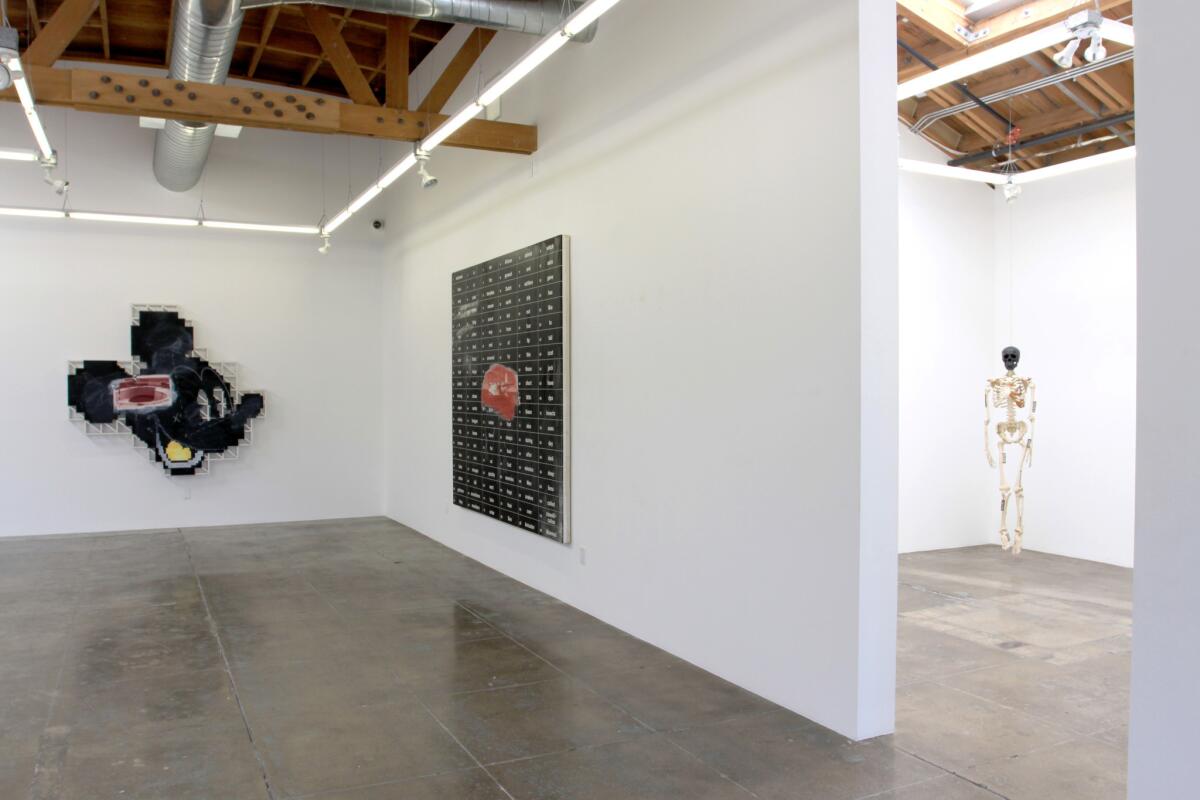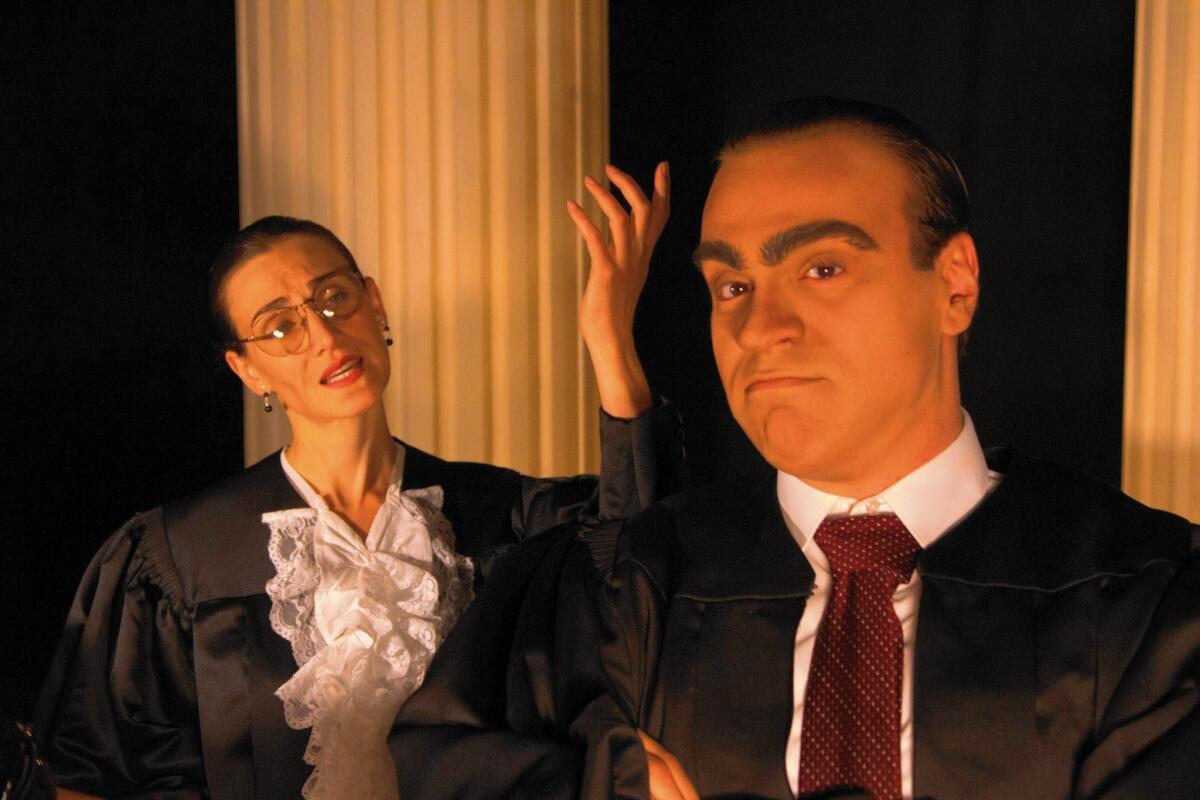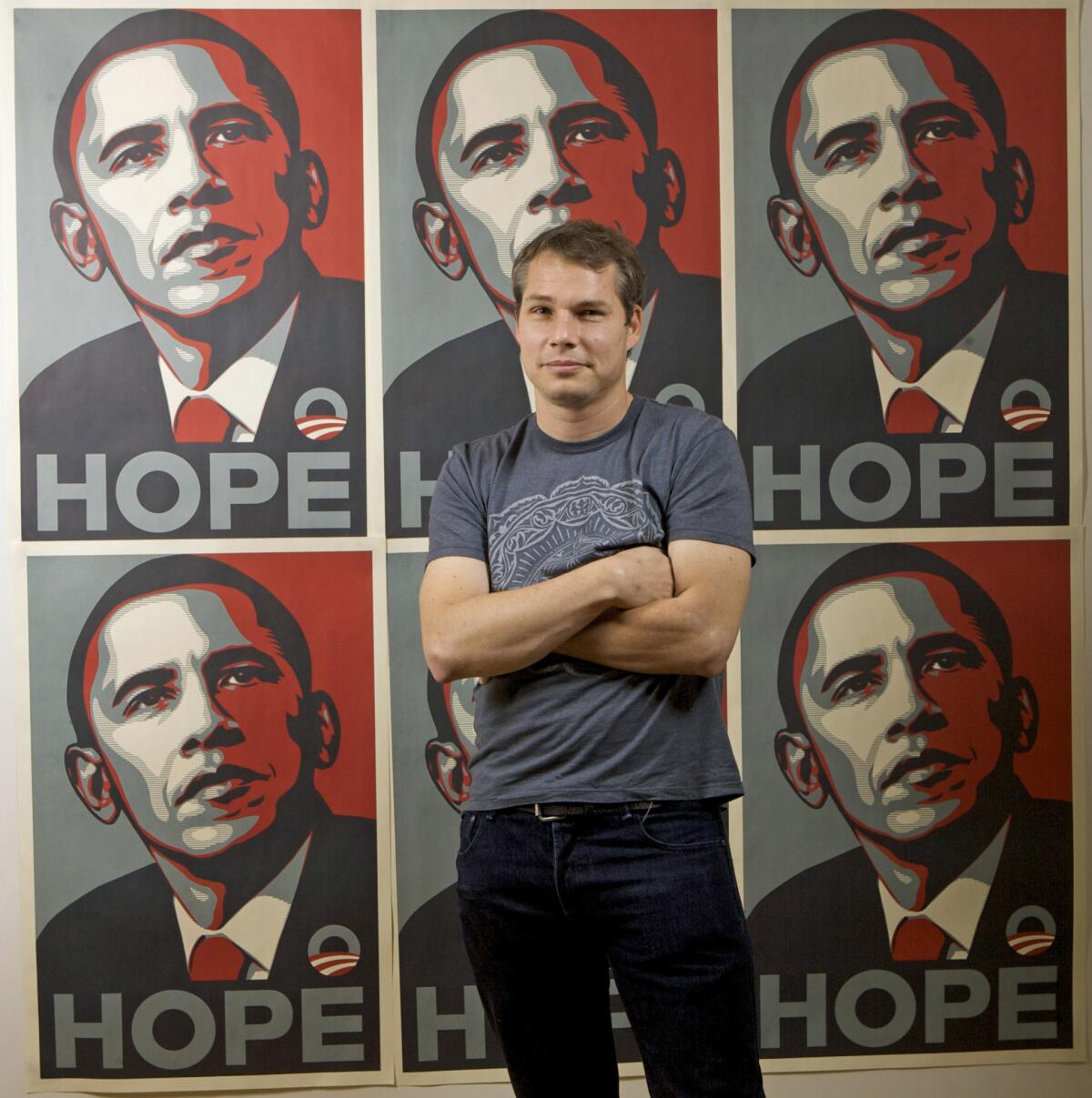Newsletter: Essential Arts: Mounting commercialism in museums, an opera odd-couple and Shepard Fairey’s bad week
- Share via
I’m Kelly Scott, arts and culture editor of the Los Angeles Times, and here are some of the stories our writers and critics covered last week.
Put that wall back up
Artworks are rented out by the museums that own them. Exhibitions with corporate pedigrees or board members' business interests at heart are common. Museum professionals curate gallery shows and gallerists double as curators. The line between nonprofit museums and the commerce of art has never been blurrier, art critic Christopher Knight writes, and it is allowing a relentless commercialism. Nonprofit status "was invented more than a century ago to foster diversity of independent thought, free from the narrow economic demands of business or the ideological commands of government. Today that independence is being corrupted,” he says.

Mark Moore Gallery in Culver City just had a Vernon Fisher exhibition curated by Hugh Davies of the Museum of Contemporary Art, Sand Diego. Davies co-organized Fisher’s 1989 survey at his museum.
Mark Moore Gallery in Culver City just had a Vernon Fisher exhibition curated by Hugh Davies of the Museum of Contemporary Art, San Diego. Davies co-organized Fisher's 1989 survey at his museum. (Jonah Olson / Mark Moore Gallery)
In re the matter of opera buffs on the court
It’s hard to resist an odd couple, and let’s face it: This couple is about as odd as it gets. Supreme Court Justice Ruth Bader Ginsburg, a reliable liberal and feminist jurist, is pals with conservative and sharp-penned Supreme Court Justice Antonin Scalia. They rarely agree on anything in court -- what brought them together? “In government, where art patronage has become anathema, the justices are opera buffs. Presumably, they argue about that too,” music critic Mark Swed writes. He listened to a new comic opera “Scalia/Ginsburg” by composer Derrick Wang which was live streamed from its premiere at the Castleton Festival in Virginia (and attended by Ginsburg). Swed called the score "a jokey pastiche," but saluted Wang's compassion for both characters.

Ellen Wieser plays Justice Ruth Bader Ginsburg and John Overholt is Justice Antonin Scalia in the Castleton Festival production of the opera "Scalia/Ginsburg." (Keith Pikus / Tjark Lienke)
Tagging, street art and the issues that ensue
The split personality of street art stardom played out in the extreme for Shepard Fairey last week. Charged (in absentia) with malicious destruction of property in Detroit for putting up posters without permission -- while he was in the city creating a massive (and legit) mural -- Fairey was arrested at LAX when the outstanding Detroit warrant came up as he was clearing customs. The news sparked a fresh round of examination of the art form, its legacy and whether those artists with work moving into museums and galleries might face a choice. “Does he want to keep the adrenaline rush of putting something up and getting away with it?" public art expert Ed Fuentes wondered. "Versus helping to bring street art into a more legitimate realm, where it's considered fine art. That's his choice as an artist.” Fairey eventually surrendered to Detroit police.

Los Angeles street artist Shepard Fairey in front of the Barack Obama “hope” artwork for which he is most famous.
Los Angeles street artist Shepard Fairey in front of the Barack Obama "hope" artwork for which he is most famous. (Damian Dovarganes / Associated Press)
He never stopped writing music
We should all be as creatively productive as the late composer Elliott Carter, who wrote 35 pieces between the age of 100 and 104 (he died in 2012). As part of Southwest Chamber Music’s LA International Festival of New Music, the group presented five song cycles Carter had set to 20th century American poets — among them e.e. cummings, Ezra Pound and Marianne Moore. Mark Swed saluted the Southwest for consistently championing Carter’s work.

Jeff von der Schmidt conducts Southwest Chamber Music with baritone Abdiel Gonzalez, wearing red, in four song cycles created by the late Elliott Carter. (Lawrence K. Ho / Los Angeles Times)
Jeff von der Schmidt conducts Southwest Chamber Music with baritone Abdiel Gonzalez, wearing red, in four song cycles created by the late Elliott Carter. (Lawrence K. Ho / Los Angeles Times)
In short
He has seen the future of San Diego Opera, and it’s as much “Carmen” as chamber operas in planetarieums. Meet recently arrived general director David Bennett, hopefully the calm after last year's storm...There is a court date for the seven-year-long legal battle between Marei von Saher and the Norton Simon Museum over the Nazi-looted two-panel Cranach "Adam" and "Eve": March 29, 2016...Rita Moreno, Cicely Tyson and Seiji Ozawa are arts figures who will receive 2015 Kennedy Center Honors. (And Carole King, if you count people who are the subject of hit Broadway musicals.)
What we’re reading and listening to
A recent issue of the Chicago Quarterly was devoted to Elliott Carter's relationship to contemporary American poetry, which makes it a fine companion to the illuminating Elliott Carter program of late song cycles put on by Southwest Chamber Music last week. The journal's website has additional material, including a broader look at the intersection between American poetry and music, as well as streaming of several works. This is of further interest, given L.A. Theatre Works production of Sarah Ruhl's “Dear Elizabeth,” about Elizabeth Bishop and Robert Lowell, at UCLA this weekend. – Mark Swed, music critic.
I found this archive, courtesy of a Frank Rich tweet. It's an annotated list of the songs Stephen Sondheim wishes he wrote. Warning: Sondheim fans can lose days replaying these tracks and reading the commentary. – Charles McNulty, theater critic.
The biggest entertainment stories
Get our big stories about Hollywood, film, television, music, arts, culture and more right in your inbox as soon as they publish.
You may occasionally receive promotional content from the Los Angeles Times.







